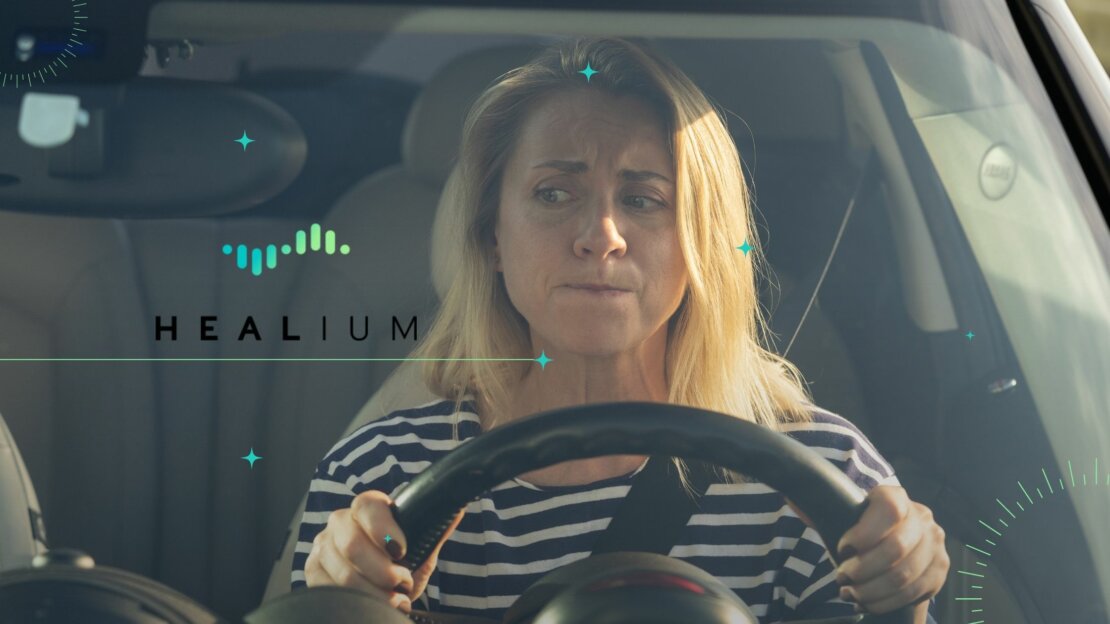




Overcome driving anxiety with research-backed advice and Healium’s VR meditation.

For many, the mere thought of getting behind the wheel triggers a cascade of worry and fear. Driving anxiety is not just about being a little nervous; it’s a profound and often paralyzing fear that can significantly hinder one’s independence and quality of life.
This blog aims to provide research-backed, empathetic advice for those looking to reclaim their confidence on the road.
Driving anxiety is an intense, often overwhelming fear associated with driving. A study conducted by Megan E. Hempel and colleagues at Massey University, New Zealand, highlighted that 20% of young older adults experience mild driving anxiety, while 6% report moderate to severe levels.
While driving anxiety varies in severity from person to person, common symptoms include a rapid heart rate, sweating, trembling, or feelings of impending doom.
A study led by Antonio R. Hidalgo-Muñoz at the University of Toulouse found that panic attacks and criticisms are prevalent triggers of driving anxiety. Traumatic memories of past accidents can lead to persistent fear, as can mental health conditions like Generalized Anxiety Disorder (GAD). However, sometimes the mere fear of losing control is enough to make drivers hyper-aware and stressed.
The first step in overcoming driving anxiety is approaching your fear with patience and compassion. Understand that anxiety is a natural response, and it’s okay to feel apprehensive about driving.
Building a strong, supportive foundation involves both mental preparation and lifestyle adjustments to help manage your anxiety levels effectively.
• Mental Preparation: Begin by acknowledging your fear without judgment. Reflect on your anxiety triggers and try to understand their roots. This understanding can be a powerful tool in addressing your fear constructively.
• Lifestyle Changes: Integrating lifestyle changes such as a regular exercise regimen can have a profound impact on your overall anxiety levels. Exercise not only promotes physical health but also releases endorphins, chemicals in your brain that act as natural painkillers and mood elevators.
Armed with a solid foundation, you can employ various practical techniques to manage and eventually overcome your driving anxiety.
• Relaxation Exercises: Techniques such as deep breathing, progressive muscle relaxation, and mindfulness meditation can be incredibly effective in calming your mind before and during driving. By focusing on your breath or progressively relaxing different muscle groups, you can anchor yourself in the present and reduce anxiety.
• Visualization: Practice visualizing yourself driving confidently and calmly. This mental rehearsal can help build a sense of control and peace over the situation. Imagine the steps you would take, from starting the car to navigating roads and parking, all while maintaining a calm and confident demeanor.
• Affirmations: Use positive affirmations to reinforce your ability to drive safely and calmly. Phrases like, “I am in control,” “I am a confident driver,” and “I can handle the road,” can be powerful in maintaining a positive and calm mindset while driving. Repeat these affirmations daily or whenever you feel your anxiety beginning to rise.
If self-help techniques aren’t enough, consider seeking professional help. Cognitive Behavioral Therapy (CBT) and exposure therapy are proven methods for treating anxiety, including driving anxiety.
• Cognitive Behavioral Therapy (CBT): CBT is a highly effective form of therapy for treating anxiety disorders, including driving anxiety. It works by helping you identify and challenge negative thought patterns and behaviors, replacing them with more positive and realistic ones.
• Exposure Therapy: This involves gradual, controlled exposure to the source of your fear—in this case, driving. Under the guidance of a professional, you’ll slowly build up your tolerance to driving-related anxiety triggers, reducing your fear over time.
• Professional Counseling: A licensed therapist or counselor can provide personalized support and strategies tailored to your specific needs and circumstances. They can also offer support for any underlying issues that may be contributing to your driving anxiety.
Overcoming driving anxiety is a journey, often requiring time, patience, and the right strategies. While the goal isn’t to eliminate anxiety entirely, managing it effectively is both achievable and empowering. To that end, Healium could be the perfect solution for you.
Healium combines the power of your brainwaves with virtual reality meditation experiences to grant users agency over their feelings of stress and anxiety. Each experience is tailored to calm your mind, but when combined with an EEG headband, users can even begin to self-regulate the brain patterns associated with anxiety. This drugless solution has been proven to reduce feelings of anxiety in as little as four minutes.
Sarah Hill, a former interactive TV news journalist at NBC, ABC, and CBS affiliates in Missouri, gained recognition for pioneering interactive news broadcasting using Google Hangouts. She is now the CEO of Healium, the world’s first biometrically powered VR channel, helping those with stress, anxiety, insomnia, and other struggles through biofeedback storytelling. With patents, clinical validation, and over seven million views, she has reshaped the landscape of immersive media.